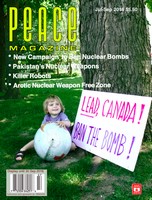
Peace Magazine Jul-Sep 2016, page 6. Some rights reserved.
Search for other articles by Earl Turcotte here
Well-founded fear is a good thing. It impels and compels action. Canadians across the country are stepping up a national campaign to persuade the Federal Government to play a greater leadership role on nuclear disarmament.
Why?
Because, like many millions throughout the world, they are deeply concerned that nine states retain a combined arsenal of 15,350 nuclear weapons, 1800 of which are on high alert status and can be launched within minutes. And rather than pursuing nuclear disarmament as legally required of all 190 States Parties to the 1970 Nuclear Non-Proliferation Treaty, they are expanding and/or modernizing their arsenals. All this is occurring at a time when East-West tensions are returning to Cold War levels, when North Korea is emerging as a significant and unpredictable nuclear power, and non-state actors—terrorist organizations including ISIS—openly boast of their intentions to acquire nuclear weapons.
The simple but horrific fact is that even a limited nuclear exchange could result in unprecedented loss of human life, global famine, and potentially irreversible climate change.
So, what can Canada do about it? A surprising amount, actually.
As a non-nuclear-armed middle power and member of both the G7 and NATO, Canada is remarkably well placed to liaise between nuclear armed NATO allies and their supporters on one hand, and the vast majority of nations throughout the world that, like Canada, seek the total elimination of nuclear weapons.
And as the country that led the Ottawa Convention process that resulted in a global ban of anti-personnel landmines, we have some experience with creative, diplomatic initiatives that yield results.
The question is, are we prepared engage with others—perhaps even to lead—in moving beyond the traditional approach to nuclear disarmament that has failed to achieve any results in more than 70 years since atomic bombs devastated the cities and people of Hiroshima and Nagasaki?
That is exactly what Canadians are asking their Government to do. To take nuclear deliberations outside the Conference on Disarmament—a closed club of 65 member states that operates on the basis of consensus; a moribund body that has not been able to agree even on a program of work for more than two decades. Where? To the UN General Assembly.
In June 2016, the Canadian Network to Abolish Nuclear Weapons (CNANW) issued a “Call to Action by the Government of Canada on Nuclear Disarmament.”1
Endorsed by 45 organizations, the document recalls the 2010 motion unanimously adopted by Canadian MPs and Senators that “encourages the Government of Canada to engage in negotiations for a nuclear weapons convention as proposed by the United Nations Secretary General and to deploy a major world-wide Canadian diplomatic initiative in support of preventing nuclear proliferation and increasing the rate of nuclear disarmament”—a noble endeavour that has yet to be acted upon.
Specifically, the CNANW and supporting organizations representing thousands of Canadians call upon the Government of Canada to:
Will Canada take up the challenge? Possibly. Hopefully.
The best way to ensure that our nation does is to make our collective concerns—and well-founded fears—known to our political leaders. And to do so in no uncertain terms, as we all have an existential stake in the outcome.
The world has already come together to ban mines, cluster munitions, chemical and biological weapons.
Isn’t it time to ban the deadliest weapon of mass destruction ever conceived?
Long-time proponent of nuclear disarmament, Senator Douglas Roche, has said it often and said it best, “We need to destroy them, before they destroy us!”
Earl Turcotte is a disarmament specialist, now retired from the Canadian Department of Foreign Affairs.
1 The call to action is available in English and French at www.web.net/~cnanw.

Peace Magazine Jul-Sep 2016, page 6. Some rights reserved.
Search for other articles by Earl Turcotte here